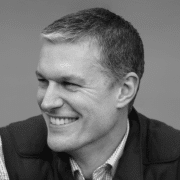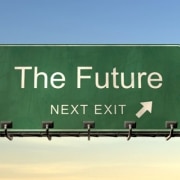Here Is What Replaces Shareholder Primacy

One day, about a decade ago, an evolutionary biologist from Binghamton, New York, made a decision: He’d use his knowledge of humanity’s social nature to try to understand and improve its social life, especially in his hometown. This lead him to, among other things, help create a school for at-risk youth that substantially boosted their performance. It got kids who flunked most of their courses the previous year to perform much better than a comparison group, in a randomized control trial. The school even brought the performance of at-risk youth on a par with the average Binghamton high school student. In The Neighborhood Project: Using Evolution to Improve My City, One Block at a Time, the scientist chronicled his efforts to better Binghamton. That Binghamton native is David Sloan Wilson, author of more than a few books, including Darwin’s Cathedral: Evolution, Religion, and the Nature of Society, and best known for showing how prosociality—behaving for the sake of others’ or society’s welfare—can evolve in a Darwinian world.
His new book, Prosocial: Using Evolutionary Science to Build Productive, Equitable, and Collaborative Groups, is sort of a grander, more expansive iteration of The Neighborhood Project. Prosocial, which Wilson co-authored with a pair of behavioral scientists, explains how humans can introduce positive changes in their social environments, in nearly any domain and scale. This, what Wilson calls a “positive change method,” is eminently useful in a business context. (That’s part of the reason why he recently joined Ethical Systems as a Collaborator.) “If it is possible to do well by doing good, so much the better,” Wilson told me. “This is an especially important point for the business world to understand.” (Visit prosocial.world to learn more.)
At first, it wasn’t easy for Wilson to see how the success he realized with the school project could be replicated in other, more unwieldy, settings. “It was difficult to see how to scale up, even for my city of Binghamton, not to speak of the whole world,” he said. “The institutional environment was unstable, especially at the higher levels. A new school superintendent or mayor might or might not want to continue working with us. Decision-making was authoritarian and capricious. At universities, the presidents and deans come and go, each trying to make their own stamp. Of course, the institutional environments of many businesses are no different.”
Prosocial takes inspiration from the Nobel Prize-winning research of Elinor Ostrom, a political scientist who studied the famous “tragedy of the commons.” The conventional wisdom was that people can avert these tragedies—overexploiting common-pool resources like pastures, forests, fisheries, and the groundwater—only by privatizing or imposing top-down regulations. Ostrom, by compiling a database of common-pool resource groups, showed this to be false. Some groups, she found, are capable of avoiding the tragedy on their own, but only if they possess a solid set of “core design principles”—namely, strong group identity and sense of purpose, fair distribution of costs and benefits, fair and inclusive decision making, monitoring agreed upon behavior, graduated sanctions for misbehaviors, fast and fair conflict resolution, authority to self-govern, and appropriate relations with other groups.
“This insight,” Wilson said, “was so new against the background of received wisdom that she was awarded the Nobel Prize in economics in 2009.” In a 2013 paper, they showed that the core design principles could be understood in general terms from an evolutionary perspective as needed for all forms of cooperation, not just the management of common-pool resources. A major aim of Prosocial is to coach groups on how to live the principles that Ostrom, just before her death in 2012, divined.
Ethical Systems recently caught up with Wilson to discuss how the prosocial method can reshape the business world, from guiding ethical workplace culture design to structuring economies for the betterment of all.
What is the Prosocial approach?
Prosocial is not just the 101th positive change method. It is a synthesis of positive change methods, rooted in foundational theory, and designed to scale from single groups, to multi-group “cultural ecosystems,” to the entire planet. For at least a decade, people and even entire disciplines have been effectively accomplishing positive change at scales ranging from single individuals (like therapeutic and training techniques) to entire populations (like reducing the incidence of problem behaviors, such as smoking). But these efforts were largely isolated from each other and from evolutionary theory. Lots of people were “doing this,” in other words, but they lacked a common language. I describe this as a “knowledge archipelago”: many islands of thought—Elinor Ostrum being a major one—with little communication among them. One of the achievements of Prosocial is to provide a common language based on a combination of evolutionary theory and complex systems theory—the two most foundational theories for just about any subject. It is a framework accessible to any group, anywhere in the world, without requiring the permission of higher-ups. Top-down support from institutions is important, but it needs to be on our terms to become part of the solution rather than part of the problem.
Is the Prosocial approach a way of increasing altruism?
It includes but goes beyond the term “altruism.” “Altruism” implies that helping others requires a degree of self-sacrifice, while “prosocial” is agnostic on that point.
How does the Prosocial process conflict with the way most major corporations view business?
For over 50 years, the business world has been influenced by a worldview—actually a moral position—popularized by Milton Friedman, which claims that the only social responsibility of a firm is to maximize profits for its shareholders. Friedman wasn’t saying that it’s okay to be greedy, no matter what the cost to others. He was saying that if everyone is greedy in a free-market environment, then they will be led, as if by an invisible hand, to benefit the common good. A lot of theorizing by economists, dignified by names such as “The First Fundamental Theorem of Welfare Economics,” is intended to buttress this claim.
The first step in the business world’s road to recovery is to reject this worldview as deeply erroneous. It is simply not the case that the unregulated pursuit of lower-level interest, such as individuals maximizing their utilities or corporations maximizing their profits, robustly benefits the higher-level common good. Instead, business groups are cooperative units that require the same core design principles as any other kind of group. They also must function as prosocial actors in multi-group cultural ecosystems at a variety of scales, from their communities of immediate stakeholders all the way up to the global scale. There are alternative worldviews within the business world that have led at least some firms to adopt the core design principles on their own, with spectacular results. One advantage of Prosocial is to make better sense of these best practices so they can be appreciated and disseminated more widely.
Why do you say that you can already see that the Prosocial approach can be scaled to address regional, national, and even global challenges.
There is no getting around the fact that life consists of groups within groups within groups. For instance, there are often multiple groupings within the workplace—work team, committees, department, divisions. Somehow, people are able to identify the relevant grouping at any particular moment and conform to its norms and dictates. Of course, if the goals of these groups are in conflict, then that will create conflict within the individual. And if serious inequities or coordination problems exist within any grouping, then that grouping will become a source of conflict, rebellion, and burnout rather than joy.
The multilevel nature of human society and the biological world must be confronted head on. In particular, we can say that the potentially disruptive effects of lower-level self-interest to higher-level functional organization exist at every rung of the multi-tier hierarchy. Self-preservation is a good thing, except when it results in self-dealing. Helping your kin is a good thing, except when it results in nepotism. Helping your friends is a good thing, except when it results in cronyism. Growing your nation’s economy is a good thing, except when it disrupts the global economy and results in heating the earth. The conclusion is inescapable: The only way to avoid the disruptive effects of lower-level cooperation is to make the global common good the target of selection and coordinate all lower-level interactions with that in mind. Another way of putting this is that the core design principles are needed for good governance at all scales. This is a tremendous conceptual simplification that Prosocial puts into practice when working with groups, both on their internal governance and also as prosocial actors in larger multi-group systems.
How would you set up an experiment within a company that wanted to test the usefulness of the Prosocial process?
Despite the global scope of Prosocial, we like to begin at the scale of small groups, such as teams or other sub-groups within a company. Our brains and bodies evolved in the context of small cooperative groups. Most people are eager to become part of a small group tasked with an important objective, where they can be known and respected for their actions and hold others accountable. This is why small groups can be regarded as the “cells” of a larger “multicellular” society such as a business. The more we can organize people and their activities into small groups, the more they will thrive as individuals and the more efficacious they will be at a larger scale. Of course, these groups must be internally structured as cooperative units and coordinated with each other to accomplish the objectives of the company. We need to avoid creating healthy cancer cells that grow at the expense of the organism.
Many companies have already discovered the power of small groups—from Agile software development teams to Amazon’s “two pizza” groups. Also, teams are typically implemented at the lower levels of a company while the top management remains in “command and control” mode. Getting the whole company to function as a team of teams is more difficult. A great book on that topic is Team of Teams: New Rules for Engagement in a Complex World, by General Stanley McCrystal, who is credited with reorganizing the US Armed forces to fight Al Qaeda in Iraq and Afghanistan. Suffice it to say that Prosocial can first prove itself at the level of small groups and then scale up to the whole organization.
What would a company culture applying the Prosocial process look like?
To begin, a company needs to become more scientific in its change methods. I love the story that Jon Haidt tells about how Starbucks responded to a racial incident by closing all of its stores for a day of diversity training. The management could have tested the five most promising diversity training methods, along with a “business as usual” control, against each other in a gigantic randomized control trial. Instead, only a single diversity training method was used for all of the stores, yielding no information about its efficacy. The scientific approach would have been no more expensive—just a matter of going about it in a different way. Once a company adopts a scientific mindset, then it is a matter of working with some bright scientists to help manage its cultural evolution, coming to an agreement on what information to gather, what experiments to conduct, and so on.
How should companies design their experiments?
For any sizable corporation, experimenting with change can and should be incremental, starting at a small scale of working with a few teams and sub-groups, and then scaling up within the organization as warranted by the results. This is where an appreciation of complex systems becomes important, in addition to an appreciation of evolutionary theory. Even a moderately sized company is sufficiently complex to result in unforeseen consequences for any change effort. This requires a humble, experimental approach. We take a step toward positive change based on the best of our current knowledge, carefully monitor the results, and then repeat the procedure.
How does evolutionary science connect with the Prosocial process?
People who are working toward positive change use words such as “evolve” and “adapt” in the vernacular all the time, without thinking to consult the formal study of evolution. There is a reason for this. Only during the last 30 years or so have people in my discipline envisioned evolution in terms of variation, selection, and replication—with genes as only one mechanism of replication. This expansion makes evolutionary science far more relevant to the study of cultural and personal change than it was before. Also, we are such a cultural species that every person needs an overarching worldview to make sense of their lives. An evolutionary worldview provides a paradigmatic alternative to the “greed is good” worldview, which can help a company improve both its internal organization and its relations with other groups. By fostering cooperation at all scales, a company can simultaneously become more ethical and more efficacious at accomplishing its objectives, including its long-term profitability as a firm deserving a high reputation.
What role did your co-authors play in writing Prosocial?
Paul Atkins and Steve Hayes bring a depth of experience and disciplinary knowledge to Prosocial that I could never match. They are two of my most esteemed colleagues from the “knowledge archipelago.” Their “island” is called Contextual Behavioral Science, which is the study of behavior in the context of everyday life, with the goal of prediction and influence in addition to understanding. Steve is a clinical psychologist who founded a positive change method called Acceptance and Commitment Therapy/Training (ACT), which has been validated by hundreds of randomized control trials. The T in ACT can stand for either Therapy or Training, because the same techniques are useful to improve any current level of functioning. Steve also helped to found the Association for Contextual Behavioral Science (ACBS) with over 8,000 members worldwide, including both academic scientists and practitioners, many of whom work in business settings. ACBS is a major conduit for the spread of Prosocial worldwide. Paul is an organizational psychologist and ACBS fellow who became an early member of the Prosocial development team. Now he is Prosocial’s chief trainer, which qualified him to be first-author of the book.
How can groups locked into an “us versus them” mentality see themselves as part of a larger “us”?
Reuniting warring groups is difficult but possible, as South Africa’s Truth and Reconciliation commission demonstrated. The “Truth” part of this process requires acknowledging the inequities that led to the conflict in the first place. The “Reconciliation” part involves the forgiveness of past inequities, but this is only possible if there is an assurance that the inequities will not be repeated in the future. In other words, structural changes in social organization are required to create a larger “us.” Companies misled by the “greed is good” ideology often create their own problems by treating competition as unambiguously good. An evolutionary worldview makes it crystal clear that competition is indeed a powerful change agent, but must be carefully orchestrated to result in cooperative outcomes. The best way for corporate leaders to become involved in efforts to apply the Prosocial process is by getting in touch with Ethical Systems, where they can work directly with Jon Haidt, myself, and our esteemed colleagues to manage the evolution of their companies.
Brian Gallagher is Ethical Systems’ Communications Director. Follow him on Twitter @BSGallagher.









